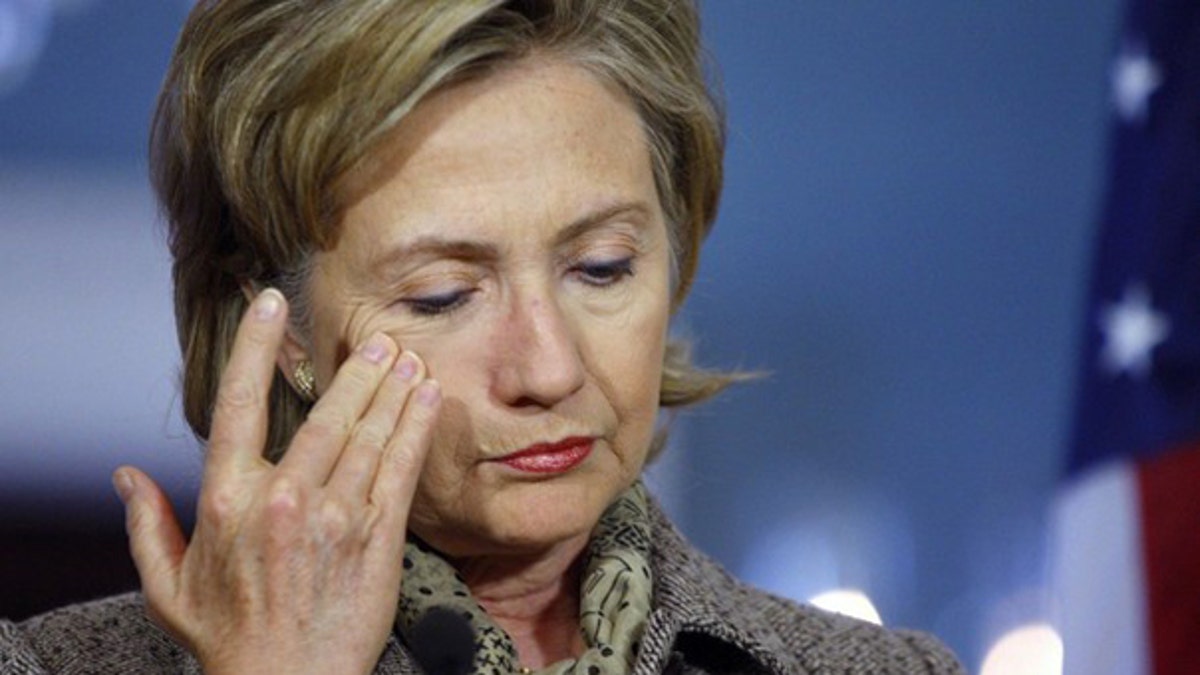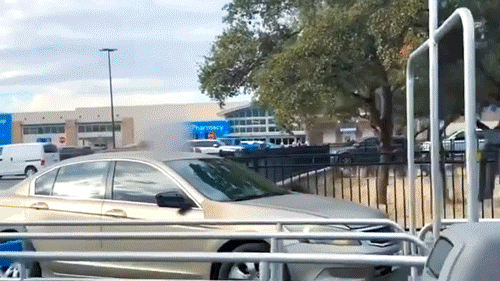
Hillary Clinton wipes her face during a press conference in Washington. (Reuters Photo)
The system worked as it should have -- which is why it failed.
That appears to be the answer emerging from top agencies like the State Department in the aftermath of the failed Christmas Day airplane bombing, as officials explain how suspect Umar Farouk Abdulmutallab was able to clear security while armed with explosives and then board a flight bound for Detroit.
Relevant departments like State, the National Counterterrorism Center and the CIA all took action on warnings dating back months that they received about the suspect. They compiled reports, they sent cables, they posted the suspect's name on a 500,000-strong watch list and occasionally reported back that they had done so.
"Based on what we know now, the State Department fully complied with the requirements set forth in the interagency process as to what should be done ... when information about a potential threat is known," Secretary of State Hillary Clinton said Monday.
"We are not satisfied," Clinton added. "We are conducting an internal review. We're looking to see whether those procedures need to be changed, upgraded."
With a full-fledged review under way, several agencies have started making changes that suggest the system in place -- which may have been followed to the letter in some instances -- missed the spirit of counterterrorism efforts.
President Obama, who is meeting with agency heads Tuesday afternoon, said as much last week when he declared "systemic failure" allowed Abdulmutallab to board the plane bound for Detroit from Nigeria by way of Amsterdam. Other officials have since acknowledged that the system probably needs some adjustment.
"Systemic failure means that individuals probably weren't at fault, but that the systems that were put in place were not adequate to the task," said David Gordon, former director of policy planning at the State Department.
In the case of the State Department, spokesman Ian Kelly said last week that after the suspect's father contacted the U.S. embassy in Nigeria in November to warn about his son's extremist ties, the warning was sent to the National Counterterrorism Center, which reviewed the case and determined there was "insufficient" evidence to withdraw Abdulmutallab's visa. Kelly said that while the State Department has the authority to revoke a visa, it's not the department's responsibility.
On the National Counterterrorism Center end, the unit also determined it did not have enough information to elevate Abdulmutallab to a no-fly list or another list that would require secondary screening at U.S. and cooperating international airports.
As a result, airport officials in Amsterdam were not compelled to pull the suspect out of line on those grounds in accordance with the Transportation Security Administration's standards.
Jim Harper, a member of a Department of Homeland Security privacy committee and scholar with the Cato Institute, said it seemed the agencies "did their best" with the system and the information they had.
"I have no reason to doubt that they followed procedure," he said, noting that the incident shows there is "room for improvement" in the visa review process for a suspected terrorist.
Two days after the failed terror attempt, Department of Homeland Security Secretary Janet Napolitano declared that "the system worked," though she later clarified she was referring to agency coordination and response after the fact.
"I think the important thing to recognize here is that once this incident occurred, everything happened that should have," she said on ABC's "This Week." "We trained for this. We planned for this."
Passenger response, which is credited with ending the attack, is listed as the last line of defense on the TSA's 20-layer security system. Ahead of that is intelligence, travel document checks, canines, behavior detection and federal air marshals, among others, none of which prevented Abdulmutallab from boarding the plane.
Other agencies have been criticized for not properly sharing the information they had. For instance, the CIA had prepared a report on the suspect before the incident but did not distribute it because an analyst was waiting for pictures, Fox News has learned.
"At the end of the day, the thing that's really going to make us safe is doing our job and identifying these people long before they get to the airport," said James Carafano, foreign policy studies director at the Heritage Foundation.
Officials have made changes to the underlying system since Christmas Day. Since the incident, the TSA has called on all passengers traveling through and from 14 selected countries to go through enhanced airport security measures, including pat-downs and full-body scanners. Four of those countries -- Cuba, Iran, Sudan and Syria -- are on the State Department's list of sponsors of terrorism. Those four do not have direct flights to the U.S.
Officials have also reviewed the more than half-million names on the general terror watch database and reportedly shifted dozens over to the no-fly list and "selectee" list requiring additional airport screening.
Harper warned that it may not be prudent to expand the terror watch list or no-fly list too drastically, since they would become unwieldy and likely do nothing to improve detection
And at the State Department, Kelly said Monday that all embassies and consulates have been directed to include information about a suspect's visa status whenever they send out alerts.
Senate Intelligence Committee Chairwoman Dianne Feinstein, D-Calif., is urging the administration to change its visa policies, writing in a letter to Obama last week that the 2008 standard is "too restrictive and should be changed."
She said the federal government "should watchlist, and deny visas to, anyone who is reasonably believed to be affiliated with, part of, or acting on behalf of a terrorist organization."
Obama was meeting Tuesday with top officials including Napolitano, Attorney General Eric Holder, CIA Director Leon Panetta, FBI Director Robert Mueller and counterterrorism adviser John Brennan.
He planned to speak Tuesday afternoon about the reforms his administration is making.












































